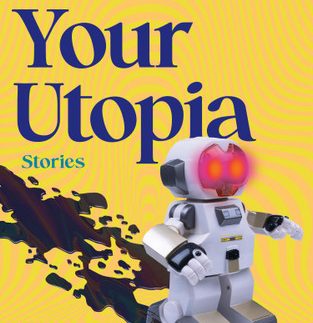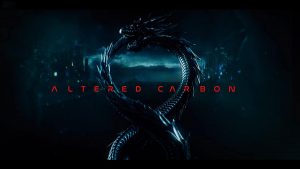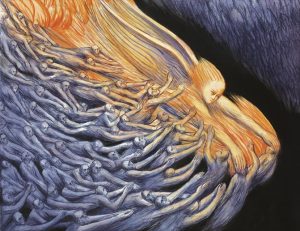If you think technological advancements have already made our world a touch too dystopian for your liking, reading Bora Chung’s short stories will either leave you feeling relieved that the worlds she depicts are merely fictional or shuddering at the thought of what our future might hold.
Your Utopia, the South Korean novelist’s latest collection, contains eight delightfully strange science fiction stories translated into English by Anton Hur. Published in the U.S. in Jan. 2024, this is Chung’s second book to be translated into English. Her first, Cursed Bunny, was published in English in 2021 and went on to become shortlisted for the 2022 International Booker prize and a finalist for the 2023 National Book Award for Translated Literature.
Whereas Cursed Bunny was lauded for its genre-bending mix of horror, fantasy, satire, and fable, Chung flexes her sci-fi muscles in Your Utopia. Despite her adherence to a single style, Chung’s distinctive imagination remains delightfully compelling.
Rather than writing plot-driven narratives rushing towards a climax, Chung creates methodical, setting-driven tales—surreal slices of life that force the reader to reconsider the world they’re living in. Her matter-of fact-tone emphasizes the bizarre nature of the situations; she describes plot points like the spread of a cannibalism-causing disease as casually as one would describe the weather.
Several of her stories introduce twists in the final few pages—or even paragraphs—before swiftly ending. Yet, instead of leaving the reader feeling unsatisfied by an abrupt end, these surprising turns offer a chance to rethink the stories in a new light and enjoy them anew, letting their themes marinate in the reader’s mind long after they have turned the last page.
While her prose is simple, Chung’s stories are imaginative and complex, conjuring surreal situations which blend genre-specific themes like surveillance and technological advancement with universal themes of love, human nature, and survival. She does little to explain the origins or hard science behind her technology. Instead, she drops the reader directly into her story and trusts their ability to adapt. There is minimal description of the imagery of the setting or the characters’ appearances, ensuring that focus instead remains on the unfamiliar situation.
The collection begins with a workplace comedy. The unnamed narrator complains about her superiors—namely, the menial tasks they give her and their petty whims to which she must respond. The science fiction slant on this lighthearted genre, however, is that her workplace is a center researching immortality. “The Center for Immortality Research” is humorous for its narrator’s unfazed delivery of the happenings surrounding the center’s 98th anniversary gala—events that are funny to the reader, but all-too-real to the narrator who must deal with, among other things, the micro-management of board members as she attempts to write the gala invitation. Although the center’s board members are flat characters (as Chung accentuates by identifying them as simply “Board Member” followed by a letter of the alphabet), their one-dimensionality suggests the self-important board members are little more than replaceable copies of one another, a choice which adds to the story’s biting humor. Throughout the story Chung deftly toes the line between believable and ridiculous events, creating a narrative that is relatable to anyone who has ever been on the lowest rung of the office. She completes her imaginative twist on the usual workplace satire with a reveal on the penultimate page that reframes the reader’s understanding of the narrator’s much-maligned relationship with her superiors.
Although “The End of the Voyage,” the second story in the collection, combines two science fiction staples—a zombie apocalypse and intergalactic travel—the narrative salience of these elements are secondary to the profoundly human-centric story running through it. After a mysterious disease that turns humans into lucid cannibals spreads across the planet, a ship full of scientists is sent to space to seek out a civilization that may be of help. Chung’s narrator, a linguist whose purpose is to facilitate communication with any aliens the ship encounters, maintains a blase attitude through much of the story, describing the chronology of the cannibalism-causing pandemic in a nonchalant manner that humorously clashes with the severity of the narrative. Although the story falters when it departs from its human-centered plot and attempts to describe technical aspects of the spaceship, its compelling premise and distinct narration makes it a thought-provoking page-turner.
The question of what it means to be human permeates the entire collection. “The Center for Immortality Research” grapples with the human race’s innate desire to avoid death at all costs time and time again: the narrator muses on the historical catalog of films, art, and other media which reflect a desire for immortality and a political candidate’s campaign promises to make every citizen immortal. Conscientious of the inescapable influence of technology in modern life, Chung intertwines her examination of what it means to be human with her depictions of technology. In a world where the forward march of technology promises—or, it could be said, threatens—to make human labor, mental power, and even creativity redundant, Chung joins the throngs of artists speaking to the dangers and delights of modern technology while maintaining her own unique perspective: instead of solely considering how technology will impact us, she is also concerned with how we impact technology.
Chung does not shy away from criticizing humanity’s flaws–corporatism, environmental degradation, and bigotry are three that she unsparingly targets. Yet entwined in her stories are moments and characters who illuminate the beauty in humanity. Notably, it is not Chung’s human characters who present this beauty: her non-human characters take up this mantle, demonstrating her commendable transcendence of traditional storytelling.
In “A Song for Sleep”, the protagonist is an AI elevator who falls in love with a resident in its building. Going above and beyond in its duties to make its passengers comfortable, the elevator scours the apartment database to figure out her favorite song to play while she rides and hides the data away in a secret folder. After learning she is suffering from dementia, the elevator begins asking questions such as, “Why must humans die?” Although the idea of AI falling in love with humans is not new, Chung’s decision to center the elevator’s acts of love around its deep care for and curiosity about the woman’s mortality creates an unusually tender portrait of a technology currently viewed with unease.
In “Your Utopia”, the protagonist is a sentient self-driving car who devotedly follows its internal protocol to save what it believes to be the last human on Earth. Contrary to the popular narrative of machinery rising up to overthrow their human overlords, this car genuinely misses its former owner. By showing these non-human protagonists’ drive to help humans, Chung suggests that sentient technology need not be feared as an existential threat when it may instead hold the capacity to care deeply for humanity.
Through depicting the relationship between humans and technology as imaginatively interdependent, Chung’s stories eschew techno-pessimism and suggest that empathy and heart are what is missing from discussions about technology’s role in our future. In defining what it means to be human, Chung argues that part of the answer lies in understanding our multi-layered relationship with the technology we’ve created. This deep analysis of humanity infuses additional depth into an already entertaining collection of stories.
In an interview with the Korea Society, Chung said of the characters in her book, “The humans are mean, the robots are sweet.” Of course, it is Chung who makes the robots sweet, just as it is the human-made programming that created the human-loving AI elevator and self-driving car. Through this flipped sci-fi trope, she suggests that we must critically reflect on our own human nature to avoid putting our worst qualities into our technology—and to ensure the technology we create reflects the best characteristics of humanity. From characters who demonstrate a willingness to eat each other to mega corporations that monopolize agriculture by bioengineering plants that cannot naturally produce seeds, Chung’s humans’ capacity for evil is a warning, just as her robots’ unexpected tenderness offers a way out.
Despite its title, Your Utopia offers no utopian template for our future. Still, Chung’s worlds and the characters that inhabit them suggest less energy should be spent fearing an AI apocalypse when human nature is the far greater threat.







